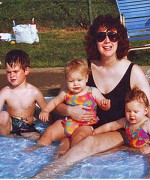Column Name
Title
Kathryn LaBouff grew up in Cedar Falls, Iowa, and attended the University of Michigan School of Music, where she earned her B.M., M.M., and D.M.A. in voice performance. She also studied at the Academia di Santa Cecilia in Rome, where she earned a performance certificate. LaBouff is assistant chair of the voice department at Manhattan School of Music, and has coached opera productions for the Metropolitan Opera, New York City Opera, Houston Grand Opera, and the Washington National Opera. Her book, Singing and Communicating in English: A Singer’s Guide to English Diction, was published by Oxford University Press in 2007. She has been on the Juilliard faculty since 1986.
Body
When did you first know you wanted to be a musician and how did you come to know it?
I’m not sure. I grew up in the middle of a professional jazz vocal quintet that toured around the Midwest. Forming diminished and augmented chords was a frequent family activity at our dinner table. My mother was a professional organist. I guess I decided to become a classical singer at around age 15.
Who was the teacher or mentor who most inspired you when you were growing up and what did you learn from that person?
Eugene Bossart, the brilliant accompanist and vocal coach at the University of Michigan. He would not allow any of his singers to perform or coach in his repertoire classes unless they could conduct the pianist through their song from the first measure to the final chord. He made the singers take on equal musical responsibility for their song, rather than defer to the pianist as the musical authority. It was astounding just how empowering that was.
What was the first recording that you remember hearing, and what was its significance to you?
It was an album of songs and arias sung by the Spanish soprano, Victoria de los Angeles. I just remember being overwhelmed by the sheer beauty of her voice and the exquisite legato line she created, regardless of how wordy the text she was singing. It inspired me to pursue classical singing.
What’s the most embarrassing moment you’ve had as a performer?
As a performer I don’t recall; I haven’t performed as a singer for many years. But as a diction coach, it’s probably having my cell phone go off during the overture of one of the productions I coached. It took me a good 30 seconds to find my cell phone and turn it off. Too dreadful for words!
If your students could only remember one thing from your teaching, what would you want it to be?
I would hope that they would remember a diction technique that will serve them in their artistic careers that was taught with kindness.
If you could have your students visit any place in the world, where would it be, and why?
I would wish them to live in one of the cultural centers of Europe for an extended period of time. I don’t think European cultures can be absorbed or understood by just touring or studying there for a brief time. The more students can understand and experience European cultures and languages through their own personal experience, the more they can bring to their own performance of European-based art and music.
What is your favorite thing about New York City?
The frenetic energy of the city that feeds and inspires us. I’ve actually never lived in New York City, but have raised my family in New Jersey. I love coming into the city to work, but I also love going home to space and quiet at the end of the day.
What are your non-music related interests or hobbies? What might people be surprised to know about you?
Between publishing a diction book last year and spending time with my husband and three children, I haven’t had a lot of time to pursue many hobbies. I’ll have to let you know what my hobbies are once my kids are all in college! People are often surprised to discover that I am a Girl Scout leader for my twin daughters’ troop. I haven’t shared this information with many people in the hope of avoiding a potential cookie-order frenzy.
What book are you reading right now?
I’m reading The Age of Innocence by Edith Wharton. I’ve read most of her books. I’m fascinated with the culture and social etiquette of the old New York elite. I’ve been working at Bard SummerScape for the past few summers and have enjoyed touring the old mansions, the summer residences of the old New York elite, along the Hudson River.
If you weren’t in the career you are in, what would you be doing?
I’d be running a small opera company in the Midwest somewhere. I may still do it someday when I grow up.





